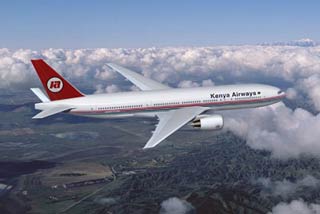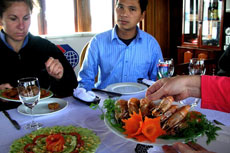Human Flower Project
Friday, February 16, 2007
Let’s Compare Carbon Footprints
UK’s international development leader decries the move to limit African flower imports.

Flower freight planes or heated greenhouses?
Photo: Kenya Airways
We wrote last week about giant retailer Tesco’s decision to cut its imports in half, a blow to Kenyan flower exporters. The change had been urged by some environmentalists, who argue that carbon emissions caused by transport planes from Africa need to be curtailed to help reverse global warming. Currently, about one third of flowers imported to the UK come from Kenya.
But Britain’s international development secretary Hilary Benn has spoken out against reducing imports from Africa. In a statement prepared for an international sustainable food conference, Benn asserted, “A recent study shows that the emissions produced by growing flowers in Kenya and flying them to the UK can be less than a fifth of those grown in heated and lighted greenhouses in Holland because Kenya is warm and sunny, and heating greenhouses in Holland uses enormous amounts of energy.” The study purportedly showed that the same quantity of flowers from Kenya produced 6,000 kg of carbon dioxide compared to 35,000 kg for flowers grown in the Netherlands.
Tesco’s decision to curb imports, announced just before Valentine’s Day, has sent the Kenyan flower industry and political officials into high explanatory gear. Kenyan High Commissioner to Britain Joseph Muchemi declared, “European nations must look to reduce their emissions first before penalising African producers. A boycott of Kenyan roses or green beans would be disastrous for many Kenyan farmers, especially small-holders, and would do little to mitigate climate change.”
Some environmentalists and human rights groups have countered that there are problems beyond carbon emissions in Kenya’s flower sector— foremost its low-wages, dangerous working conditions and the heavy pollution of Lake Naivasha.
Muchemi emphasized that with all its shortcomings the burgeoning flower industry has brought the prospect of stability and education within reach for many Kenyan families that had been living in dire poverty. He told the Guardian that cut flower companies in Kenya employ 500,000 people and perhaps a million more who work in related service industries. “Food miles is a valuable concept,” he said, “but it must be looked at in the whole.”
A whole that includes economic disparity, underdevelopment, ecology, luxury, hunger, and cultural differences is hard to resolve. It’s called Our World.




